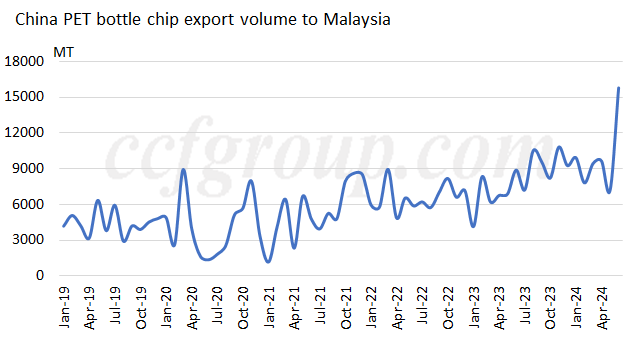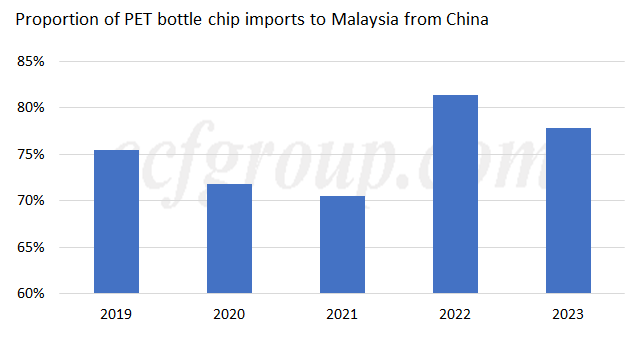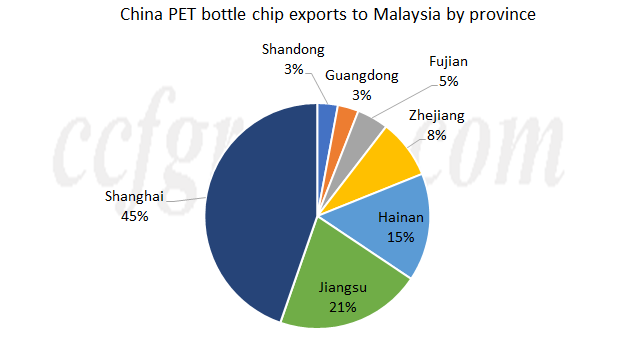How will Malaysia's anti-dumping investigation affect China's PET bottle chip exports?
Recently, Malaysia's Ministry of Investment, Trade and Industry announced the initiation of an anti-dumping investigation regarding polyethylene terephthalate (PET) resin originating or imported from China and Indonesia. This action follows an application submitted by domestic producer Recron (Malaysia) Sdn. Bhd. on July 10, 2024. The relevant Malaysian Harmonized System (HS) code and ASEAN Harmonized Tariff Nomenclature (AHTN) code for the products in question is 3907.61.00 00. The preliminary ruling is expected to be made within 120 days from the date of filing.
How will Malaysia's initiation of this anti-dumping investigation affect China's PET bottle chip exports?
Prior to 2022, China's exports of PET bottle chips to Malaysia remained relatively stable, typically ranging between 50,000 to 70,000 tons, accounting for about 70-75% of the local import volume and around 2% of China's total exports. However, since March 18, 2022, when regulations came into effect in Malaysia, Chinese PET bottle chip producers began to increase efforts to develop the Malaysian market, resulting in a sharp rise in Malaysian import dependency, which climbed to 81%. In 2022-2023, the total volume of PET bottle chips exported from China to Malaysia reached 79,000 tons and 97,000 tons, with year-over-year increases of 22.1% and 22.7%, respectively.


From 2023 data on exports from China to Malaysia, provinces such as Shanghai, Jiangsu, Hainan, and Zhejiang accounted for a significant portion, totaling 87,000 tons and nearing 90% of the exports, with nearly half originating from Shanghai alone. Therefore, the anti-dumping investigation initiated by Malaysia could significantly impact Far Eastern Shanghai, as Malaysia accounted for 19% of their total exports last year (with total exports in 2023 reaching 225,000 tons).

Looking at the supply and demand situation in Malaysia, there are mainly two local PET bottle chip producers: Recron (owned by Indian Reliance Group) and MPI, with capacities of 150,000 tons and 40,000 tons, respectively. According to CCFGroup statistics, Malaysia's apparent domestic consumption is around 150,000 to 200,000 tons, with 2023 exports at 142,000 tons and imports at approximately 122,000 tons. Without considering maintenance and production cutbacks, Malaysia could theoretically achieve self-sufficiency. In reality, the impact of foreign exporters on local PET producers in Malaysia is minimal, likely more affecting competitors outside China eyeing the Malaysian market share. In the first half of 2024, China's export customs data indicate that Malaysia imported 60,000 tons from China, representing a 45% year-over-year increase, with June seeing a notable increase of 77.6%, largely due to some shipping delays. Following the original trends, total imports for the year are expected to exceed 100,000 tons. However, with Malaysia announcing the investigation into Chinese PET bottle chip manufacturers, the volume of export orders from Chinese producers is anticipated to decline quickly in response to the potential imposition of anti-dumping duties. Despite this, due to factors like existing annual contracts, there may still be some limited volume reflected in customs declaration data in the short term.
Overall, given that China's exports of PET bottle chips to Malaysia are not substantial, and the number of affected Chinese manufacturers is relatively limited, the overall impact on China's PET bottle chip export situation is expected to be minimal. Yet, the involved companies may need to actively respond to these investigations to achieve favorable outcomes, as their individual stakes are significant.
- Top keywords
- Cotton Price
- Cotton Futures Price
- Cotton Futures
- CZCE
- PTA Futures Price
- Chemical Fiber
- Polyester Prices
- Wool price
- PTA Futures
- Shengze Silk
- China
- Yarn Price
- price
- China Textile City
- Fibre Price
- Benzene Price
- Cotton
- Index
- Cotton Index
- PTA
- fabric price
- NYMEX
- Top 10
- textile industry
- Spot Cotton
- Cotton Yarn
- Polyester Price
- Futures
- PTA Price
- cotton yarn price

